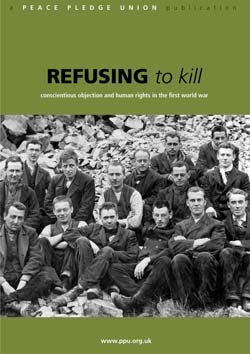
Refusing to kill, available from the PPU.
| more >
|
What people have said
David Boulton The Friend October 2006
Many years ago, when I was collecting first world war conscientious objectors’ memorabilia for a book, I came across a rare group photograph. It showed fifteen COs at Dyce work-camp, near Aberdeen, where 250 men, including 23 who had been sentenced to death and reprieved, were housed in old army tents throughout the arctic winter of 1916 and put to heavy manual work in the quarries.
In the front row of the group sat one young man, his arms folded and his face set in a striking attitude of confidence born of unflinching idealism. Or so I read it. I used the picture on the cover of my book; but when Philip Toynbee reviewed it in the Observer he read the photo differently. For him it was a picture of smug self-satisfaction. Idealism? Smugness? Which was it? Is this a case of the eye of the beholder, where one man’s altruism is another’s self-satisfaction? What do others see when they look into our Quaker faces?
A bigger, sharper, more vivid version of the Dyce photo is again a front-cover illustration, this time on the Peace Pledge Union’s superb magazine-format booklet Refusing to Kill, which collects letters, case-histories, photographs and documents to re-tell the story. Looking at it again, what I see is fifteen young men, quietly defiant, some smiling wryly (have they been told to say ‘cheese’), all squatting uncomfortably on their pile of newly-quarried rocks. There is no hint of the harsh winter to come: the cold, the wet, the sickness and death. What strikes me about these faces now is their ordinariness. They could be soldiers, convicts, Quakers, communists - even just quarrymen. John Bull magazine, on the other hand, saw them as ‘the scum of the nation... cowardly worms... invertebrates, devoid of citizenship, bloodless, deaf to the cry of humanity...’ Because they had refused to kill.
The PPU’s booklet tells the story of the 16,000 men who ‘stood up for the right to refuse to kill other human beings’ and thereby laid the foundations for today’s mass movements for peace and human rights. The publishers say it is ‘intended primarily for teachers and students of History, Citizenship and English at Key Stage 3 and 4’, but that underplays its likely appeal to the general reader looking for a reliable summary based on a vivid narrative supported by a wealth of documentation. I know of no better account.
Distinctions between ‘absolutists’ who refused any compromise with the military state and ‘non-combatant’ COs who accepted non-military ‘work of national importance’ are carefully explained, as are those between religious and political objectors. We are taken through the conscription acts, the workings of the tribunals, the prison system, the death sentences followed by last-minute reprieves, and those who died in custody. In the last and longest chapter we get to see it all from the COs’ point of view, by way of their diaries, letters and post-war memories. At no point, however, are the sufferings of the ‘conchies’ compared with those of the young soldiers who ‘asked not the reason why’ but obeyed the call to ‘do or die’, and were shredded by shrapnel or drowned in the mud of the Somme. There is no absolute arbiter of conscience.
No single writer is credited, but I understand that a line in small print on the fly-leaf reading ‘Text Oliver Haslam’ is not an invitation but a clue to the identity of the principal author, who is to be congratulated on a fine piece of history writing. Refusing to Kill ‘highlights the courage, determination and, above all, the human spirit of those who resisted militarism... They were ordinary people in extraordinary circumstances who showed that even in the darkest times we can resist the call to war and point to a better way of managing human affairs - a message that people today, particularly the young, should remember as the world wars of the last century fade into history and current wars rage on.'
Refusing to Kill should be in every meetinghouse library. Available with it is a free Activity CD including a play-script based on a tribunal hearing, which ought to stimulate young Friends with a thespian bent, . It is available for £15 from the PPU, 1 Peace Passage, London N7 0BT.
David Boulton
|